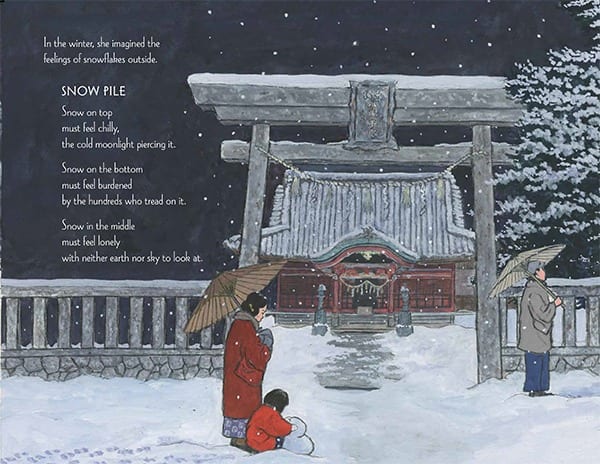WITS Voices: The Inspiration of Misuzu Kaneko
March 28, 2018
By Kathleen Flenniken, WITS Writer-in-Residence
This fall, I’ve been teaching poetry to fourth graders at View Ridge Elementary in Seattle. Each week before I share the poem that will be our mentor text, I show my students a photograph of the poet and offer a few words about the poet’s concerns, life, and times.
In the case of Misuzu Kaneko, her very moving biography became part of our inspiration. I discovered a book published by Chin Music Press in 2016 called Are You an Echo: The Lost Poetry of Misuzu Kaneko, with a narrative by David Jacobson, translation by Sally Ito and Michiko Tsuboi, and illustrations by Toshikado Hajiri.

The lovingly-illustrated book is divided into a sensitively-told biography and a collection of Misuzu’s poems. The biography takes about 15 minutes to read and follows Misuzu through her short, tragic, inspiring life, but also tells the story of how her poems were nearly lost and then rediscovered decades later by poet Setsuo Yazaki. The biography concludes with the 2011 earthquake and tsunami in Japan and the role that one of Misuzu’s poems, “Are You an Echo?” played in comforting and inspiring a suffering nation.
The biography includes poems along the way, including “Snow Pile:”

Snow Pile
Snow on top
must feel chilly,
the cold moonlight piercing it.
Snow on the bottom
must feel burdened
by the hundred who tread on it.
Snow in the middle
must feel lonely
with neither earth nor sky to look at.
Misuzu Kaneko writes simply and brilliantly about objects and animals and gives them feelings. Her poems are an opportunity to talk about personification, and better yet, practice it.
We looked at three poems in some detail: “Snow Pile,” “Waves,” and “Telephone Pole.”
Waves
Waves are children
laughing and holding hands.
Together, they come.
Waves are erasers
wiping away words
written on the sand.
Waves are soldiers
advancing from the open sea,
firing their guns.
Waves are forgetful,
leaving pretty, pretty shells
behind on the sand.
Telephone Pole
Hearing sparrows chattering close to its ears
the telephone pole opens its eyes.
When the vegetable carts have gone,
the laborers come trudging by the pole.
Just after noon, a wind blows.
The children press their ears to it.
A balloon whose string was cut
brushes past the pole’s nose and flies off.
The day ends with the sunset;
close to the pole’s head, stars appear.
At its feet, the Salvation Army choir sings,
making the telephone pole sleepy.
In our conversation, I was careful to point out the bright details in each poem—the balloon whose string was cut brushing past the pole’s nose, the children pressing their ears to the pole, the child/waves laughing and holding hands. I am very keen to emphasize complete images and metaphors. We noticed in “Waves” that every stanza was a new metaphor. We noticed that “Telephone Pole” was a study of the pole’s “day” from morning to night.
The students went to work writing their own poems, based on one or all three of these poems and most especially the idea of bestowing feelings to the everyday objects we often overlook. Here are just a few:
The Flag at School
Levi
When the sun rises the flag opens
its eyes.
The flag likes mornings because it sees
kids with their backpacks and cars
pulling up with kids getting out of them.
Afternoons are lonely, no one outside
until recess except some teachers.
Late afternoons are fun everybody saying Goodbye
to each other a breeze blows the flag
It waves bye to everyone.
Night is not so fun everybody gone except
a raccoon the gentle breeze blows it to sleep.
The Desks and Chairs
Bennett
Our chairs must be tired
from holding up our weight all day long
Might the desks be hoping,
praying to jump up and be the tree
that they were before they were cut down?
The metal legs that hold them up
must be tired, wanting to go back
in the mine where they came from.

Acorn
Oscar
Hanging on barely to the branch,
a grey fluffball and a blue streak
come towards it.
The squirrel grabs it but the blue jay is
biting into it.
They drop it and it falls onto
some moss. It feels lucky that it
had its brown helmet on.
It confused a snail when it fell.
It thought it was a wrecking ball.
A gust of wind blows it into a pond.
The fish go after it. but a salmon flips
the acorn out of the water.
The acorn is relieved that it is
out of danger. It rolls into a small
hole, and ten years later, an oak tree
is in its place.
Then it sees a grey fluffball and
a blue streak coming toward its acorn.
Head
Benjamin
The hairs on top
are having fun
being blown around
The teeth on the bottom
are feeling bored
because they are just doing the same thing
The brain in the middle
is excited
because it gets to whirr to it’s heart’s content

My Brain
Griffin
My brain is the thing
the thing of all things
the thing that trails behind
when I’m trying to write
the thing that thinks
and blanks out too
the thing that bosses my
body around
the thing that says “yes”
and “no”
the thing that says
“I don’t wanna go to school”
the thing that likes candy
the thing that likes books
the thing that likes TV too
the thing that likes you
the thing that likes to draw
and be creative too
The Gymnast’s Hands
Avery
Her hands are like a little girl
dancing all by herself
Her hands are erasers
erasing the air
with her bare hands
Her hands move as
they want to go on
the uneven bars
Her hands leave
heart marks to show
how much she loves

Cloud’s Shadow
Nella
The cloud’s shadow feels glum so black
like the night.
The cloud’s shadow is quiet as
a mouse trying to get past a smart cat
The cloud’s shadow is smart
it knows where the cloud is all the time
The cloud’s voice is dark even if it is
kind and sweet
The cloud’s shadow looks sad but
will never tell
The cloud’s shadow slides on the lonely
monkey bars of the park away in the darkness
Knitting Needles
Claire
Clapping my hands, I see the
waves of fabric I have created.
An old woman, holding me by
the feet.
The thread wraps around me
like a long woolen scarf.
As the day grew shorter,
I grew longer.
A long, wavy, waterfall
of red yarn grows as if it
isn’t going to stop.
Halley’s Comet
Ty
Halley’s Comet strikes through the sky
like a snake catching its meal
Halley’s Comet is like a light bulb
coming off and on every 77 years
Halley’s Comet goes through earth’s orbit
as if it is looking straight at you.
Halley’s Comet goes through the stars
as if it is a plane going by with no sound
Halley’s Comet is a tail of a dog
that is running past you
I wonder what it feels. Maybe it is lonely
orbiting the sun all by itself.

 Kathleen Flenniken is the author of two poetry collections: Plume, winner of the Washington State Book Award and finalist for the William Carlos Williams Award from the Poetry Society of America, and Famous, winner of the Prairie Schooner Book Prize and named a Notable Book by the American Library Association. Her awards include a fellowship from the NEA and a Pushcart Prize. She served as Washington State Poet Laureate from 2012 – 2014.
Kathleen Flenniken is the author of two poetry collections: Plume, winner of the Washington State Book Award and finalist for the William Carlos Williams Award from the Poetry Society of America, and Famous, winner of the Prairie Schooner Book Prize and named a Notable Book by the American Library Association. Her awards include a fellowship from the NEA and a Pushcart Prize. She served as Washington State Poet Laureate from 2012 – 2014.